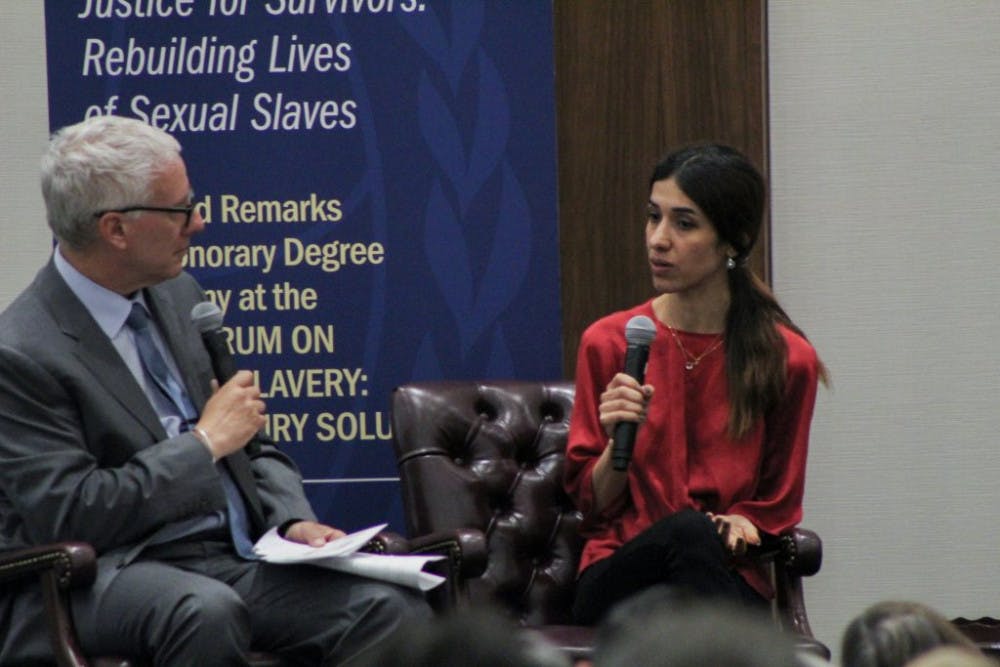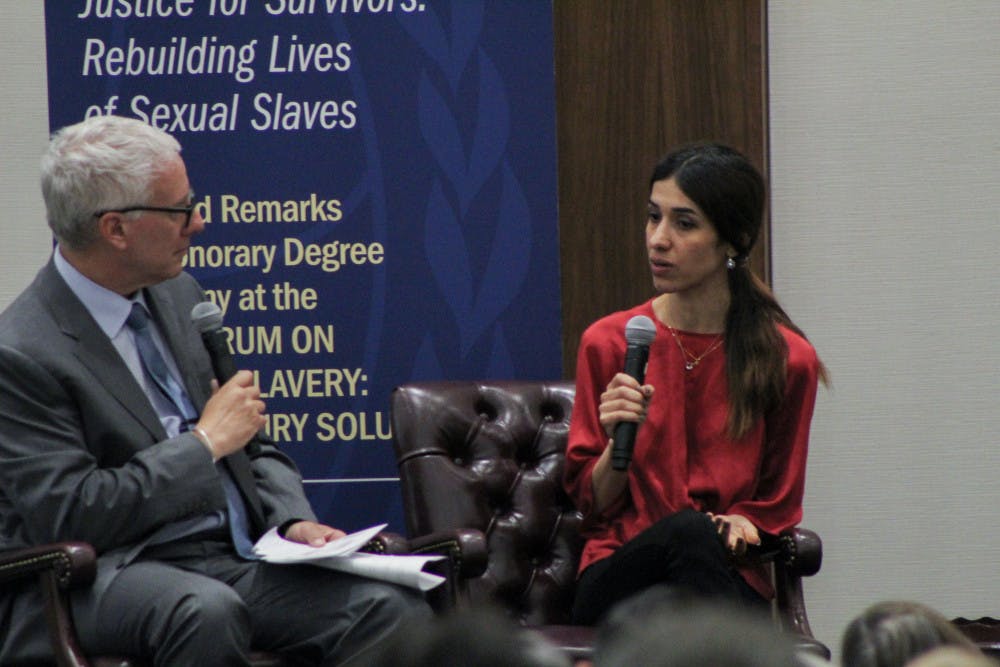Nobel Laureate Nadia Murad was presented with an honorary degree from Seton Hall University last Friday at an event hosted by the College of Diplomacy and International Relations.

The event, a “Forum on Modern Slavery: 21st Century Solutions” was organized in association with the Slave Free Community Project, the New Jersey Coalition Against Human Trafficking and the International Justice Project.
The public forum included several breakout panels in which experts discussed the nature of slavery and potential solutions.
The sessions included topics such as the modern slavery in the U.S., slavery as an instrument of armed conflict, the impact of the UN on slavery, and how slavery is being prevented with the help of education, visual media, and emerging technology.
The sessions were followed by the honorary degree ceremony and a Q&A with Nadia Murad.
Murad was born in a small Iraqi village and is a member of the Yazidi ethnic group.
In 2014, when Murad was 19 years old, the Islamic State in Iraq and Syria (ISIS) attacked her village, killing 600 men and enslaving many girls and young women. During her time in slavery, Murad was subjected to beatings and sexual assaults. Thousands of Yazidi women are still missing.
After escaping to a refugee camp, Nadia was able to move to Germany, where she formed Nadia’s Initiative, an organization which works to advocate on the international stage for Yazidi women and other victims of sexual violence and genocide.
In addition to raising awareness and advocating for justice, Nadia’s Initiative has also set up the Sinjar Action Fund, which helps advance reconstruction efforts in areas affected by violence, according to the Initiative’s website.
Murad was awarded the Nobel Peace Prize for her efforts in 2018.
In a Q&A with journalist David Brancaccio, Murad discussed how she was able to use her pain to motivate her to become an advocate for others in the Yazidi community and around the world.
“After losing nine members of my family, I used that horrible experience to help others and to speak about what happened to me, to be a voice for others,” Murad said.
Murad also emphasized the voice to stand for what is right and to help survivors of slavery and sexual violence.
“Doctors, teachers, whatever your line of work is, you can use your voice and you can use your time to help others and to speak about these issues,” Murad said.
Not without a sense of humor, Murad simply responded, “Yes.”
Alyssa Futa, a Junior diplomacy and international major, who was Master of Ceremonies for the event, introduced Murad.
“To share the stage with someone who has done so much to raise awareness and advocated for justice and programs that benefit those who are survivors of human trafficking and genocide was a complete honor,” Futa said. “To know that [slavery] still exists and is growing every year is mind blowing, so to even play a small role in raising awareness and encouraging education and advocacy was incredibly rewarding.”
Elizabeth Halpin Associate Dean of the School of Diplomacy, was approached by the Slave Free Community Project with the idea for the forum.
“I thought it was an excellent next step to the prior events we have cohosted with the organization, to bring awareness and consider solutions for human trafficking in its many forms,” Halpin said.
More than 450 people were registered to attend the event, with students, staff, community members and many organizations in attendance.
Amanda Parsons, a freshman who is still undecided, attended the event to learn more about human trafficking.
"This was a really good opportunity that not everyone [can] take advantage of,” Parsons said.
Many organizations attended the forum to learn more about solutions to human trafficking and to network with other leaders in the field.
Sterlinda Vital attended the event due to her role in Objectif IT, a Hatian organization which works with vulnerable women and children.
“I have worked for the United Nations as a child relations specialist for ten years, and currently I’m working as a leader of a grassroots organization, so I’m here to share [my] experience and to network,” Vital said.
Shauna Canter of the National Organization for Women (NOW) attended the event in order to bring information about modern slavery back to her organization and the scouting troop she leads.
“It had a lot to offer me, coming in as a novice,” Canter said. “It had a nice range of perspectives and offered a good opportunity to meet leaders in the field.”
The School of Diplomacy plans to host similar events in the near future, including a conference on peace and conflict on Oct. 10.
Daniel O’Connor can be reached at daniel.oconnor1@student.shu.edu.





